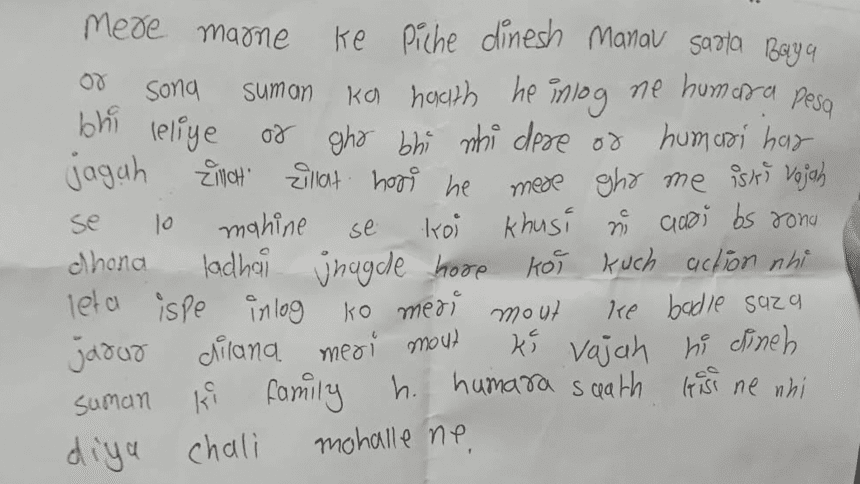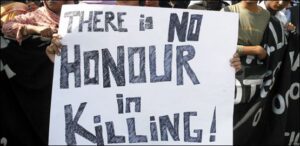Forty days after a 15-year-old Muslim girl died by suicide, leaving behind a note naming her harassers, her family is still waiting for justice and the keys to the home they purchased with their life savings.
The family, residing in Gomtipur, Ahmedabad, describes their dream of owning a home across from their rented space as transformed into a nightmare filled with harassment, violence, and bureaucratic challenges stemming from Gujarat’s Disturbed Areas Act—a law the family claims has been weaponized against them due to their Muslim identity.
Ten months ago, they bought a house from their Hindu neighbor, Suman Sonavde. By December 2024, the family had made the full payment. However, before the handover could occur, Sonavde passed away. His son, Dinesh, who occupies the upper floor of the building, has refused to transfer the property, citing the Disturbed Areas Act, which restricts property transactions in designated areas.
What began as a straightforward real estate transaction soon escalated into a contentious dispute influenced by local Hindutva groups, evolving into a situation defined by communal tensions and, according to the family, months of relentless harassment.
On August 7, Dinesh and his relatives allegedly attacked Saniya and her younger brother. Two days later, Saniya died by suicide, leaving a note naming Dinesh and his associates as her tormentors. “Because of them, there has been no joy in my house for the last 10 months, only tears and fighting,” she wrote in her suicide note, which was reviewed by Maktoob.
Her eldest sister recounted the family’s ordeal, stating, “They dragged her by her hair, beat her and kicked my brother. She killed herself waiting for someone to save us.”
The family alleges that Dinesh frequently harassed them by throwing water at them, making lewd gestures from across the street, and following Saniya’s younger sister to school. “We never opened the windows even if we felt suffocated,” her sister added.
Each time the family approached the police to report the harassment and assaults, they were allegedly threatened with charges under the Prevention of Anti-Social Activities Act and warned that the sale could be invalidated under the Disturbed Areas Act.
Following Saniya’s death, the family faced significant challenges in getting the police to register a First Information Report (FIR), despite presenting CCTV footage and the suicide note. The FIR now includes six individuals, charging them with abetment of suicide of a minor and harassment. Yet, as of now, no arrests have been made.
A Law Under Scrutiny
Central to this tragedy is the Gujarat Disturbed Areas Act of 1991, which necessitates that both buyers and sellers gain prior approval from the district collector before property transactions can occur in officially designated “disturbed areas.” Originally instituted to prevent Muslims from being coerced into selling their homes at below market values during riots, critics contend that the Act has been repurposed as a tool for ghettoization.
Large portions of Ahmedabad, Vadodara, and Surat have remained under the “disturbed” classification for decades, even in times of peace. Amendments to the law in 2020 criminalized proxy sales and expanded the powers of authorities to annul transactions.
“Families looking to relocate encounter bureaucratic hurdles—collector’s permission can take months and is often denied without explanation,” stated Mujahid Nafees, convener of the Minority Coordination Committee.
Activists assert that the Act effectively prevents Muslims from purchasing homes in Hindu-majority areas, reinforcing religious segregation. “The law creates an illusion of neutrality, yet its impact is discriminatory. It instructs Muslims to stay in their place,” Nafees added.
Gomtipur, where the Ansari family resides, is a Muslim-majority neighborhood with approximately 400,000 residents. The area is plagued by overcrowding, poor drainage, inadequate schools, and insufficient infrastructure.
Even when Muslims obtain legal permission to buy homes in Hindu-dominated areas, activists report they frequently face pressure from Hindutva groups to abort the sale, as witnessed in this incident.
The Gujarat government defends the law as essential for maintaining public peace and preventing demographic changes that could potentially lead to violence. However, human rights organizations argue that this justification supports segregation and empowers vigilante groups to control neighborhoods. “This tragic incident of a 15-year-old’s suicide raises critical concerns regarding the misuse of the Act,” remarked a local activist from Gomtipur.
Allegations of corruption have also emerged in the process of acquiring the collector’s No Objection Certificate (NOC), which is a requisite for any transaction. “A rate card for issuing NOCs exists—everyone is aware of it,” he claimed.
The tragedy has ignited outrage among housing rights activists, who view it as a tragic outcome of institutionalized segregation. “Laws are meant to protect minorities. In Gujarat, this law extinguished a young woman’s dream—and ultimately, her life,” Nafees stated.
The Ansari family continues to live in their rented house, directly facing the property they purchased but have yet to enter. “Saniya was very excited about moving into the new house,” her sister reflected. “She envisioned decorating her own space, but now she is gone.”
Tags: Gujarat, Disturbed Areas Act, Muslim teen suicide, harassment, neighbours
Hashtags: #Gujarats #Disturbed #Areas #Act #harassment #drove #Muslim #teen #suicide #arrest #neighbours #named #letter










